
Features
Columns
Education
Future watch
Students at Lindsay, Ont.’s Fleming College invest in construction’s future
August 6, 2010 By Andy Bateman
Students from differing backgrounds are enrolling at one of Canada’s
best-known mobile equipment training programs to gain marketable job
skills in times of economic instability.
Students from differing backgrounds are enrolling at one of Canada’s best-known mobile equipment training programs to gain marketable job skills in times of economic instability.
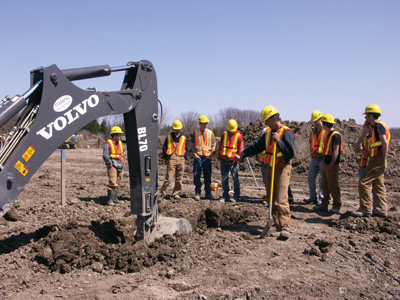 |
|
| Fleming College students safely locating a water supply pipe.
|
Despite what it might feel like, employment prospects for the construction industry remain relatively bright, thanks to the combined effects of government infrastructure spending and the impending retirement of many of the industry’s older workers. Aggregates & Roadbuilding recently visited The Centre for Heavy Equipment Technology at Fleming College’s Frost campus in Lindsay, Ont., to see how the needs of the industry and its future employees are being met.
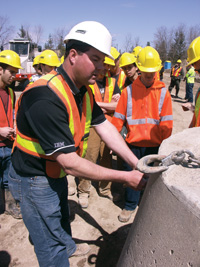
|
|
| Fleming College operator instructor James Miller is dedicated to helping shape the minds of tomorrow. Here, he explains the finer points of lifting procedures to his students.
|
Operator Instructor James Miller explains that the Centre’s Heavy Equipment Operator program focuses on bulldozers, wheel loaders, tractor loader backhoes, hydraulic excavators and other construction site equipment. The course content is designed to replicate actual work situations as closely as possible, with a high percentage of program hours devoted to equipment operation.
A rotation schedule ensures that all students operate all machines, with classroom sessions followed by a site demonstration and practical exercises at one of the Centre’s equipment testing grounds. Program modules include heavy equipment operating techniques (276 hours), personal, work site and equipment safety (24 hours), equipment maintenance (24 hrs) and resumé building and career development (36 hours).
A combined approach
On the day visited, students first attended a classroom session describing safe working practice working with and around underground utilities such as gas, water and power lines. Theory was then immediately put into practice, with students at the controls of excavators to lift and place typical utility components such as plastic and concrete pipe. Site practice included proper techniques for excavating to grade and backfilling around buried utilities, with students also learning how to safely use hand tools such as shovels around buried lines.
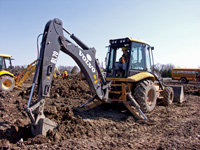 |
|
| : Fleming College has two Volvo BL 70 backhoe loaders at its disposal. Here, a student operator puts one through its paces.
|
|
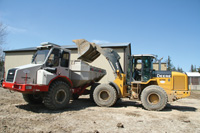 |
|
| A student operator in a John Deere 544J wheel loader loads a Link-Belt D16 articulated dump truck.
|
|
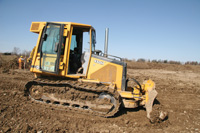 |
|
| This John Deere 450H crawler dozer is just one of an impressive mobile equipment fleet available to students at the college.
|
A simulator developed by John Deere is a valuable tool in the operator training process and is used to make a preliminary assessment of students’ skills before moving onto actual equipment. The realistic and challenging simulator records incidents such as accidental “contact” with nearby objects and even estimates the overall profitability of each operator’s daily working performance.
The Centre’s Heavy Equipment Techniques program focuses on the overhaul, maintenance and repair of heavy equipment. Target industries listed for this program include earth moving, aggregate extraction, forest harvesting, materials handling, transportation and mining equipment.
According to course literature, students who complete this program will have a comprehensive background in mechanical studies, preventive maintenance, safe shop practices and equipment management systems. Here again, the emphasis is on practical skills, with the program’s first semester including shop practice (42 hours), electrical systems 1 (75 hours), engines I (75 hours) hydraulic systems I (75 hours), parts maintenance and service (45 hours), power trains I (75 hours), professional portfolio development (45 hours) and welding and materials (18 hours).
Semester two consists of a paid internship of 450 hours, in which students apply the skills learned during the first semester. The program’s third semester builds on the first two and includes electrical systems II (75 hours), electronic engine management (60 hours), engines II (75 hours), environmental issues for industry (45 hours), hydraulic systems II (75 hours), power trains II (75 hours) and shop practice (45 hours).
Students in both of these programs have access to an extensive mobile equipment fleet owned by the Centre, including John Deere 310 SG, Volvo BL 70 (2), Caterpillar 420 D, New Holland LB75B and Case 580 tractor loader backhoes, Caterpillar D5G XL, John Deere 450H and Liebherr 711 dozers, Volvo EC 140, Caterpillar 307 and 315 excavators as well as John Deere 544J and Caterpillar IT28 wheel loaders. Additional equipment includes a Volvo G976 grader, Link-Belt D16 Articulated Dump Truck, Bomag BW 172PD and Dynapac CA 150PD compactors and a Bobcat S250 skid steer.
Growth potential
Carmen Moore, professor/co-ordinator at the Centre, explains that the 12-week Heavy Equipment Operator program currently has start dates in March, June and August each year. Its goal is to teach students the essentials of machine operation, maintenance and service, with high school graduates normally making up the majority of course entrants. As a sign of the times perhaps, this semester’s intake also includes older workers from Ontario’s battered manufacturing sector who are seeking to retrain and find opportunities in a new industry. Female participation in both programs is slowly increasing but remains below 10 per cent. Currently, a heavy equipment operator program will have perhaps two or three women in a class of 40 while female enrolment in the motive power techniques is usually somewhat higher with five or six women in a class of 70.
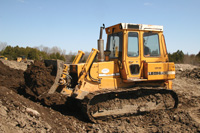
|
|
| Still going strong: a Liebherr 711 in action at Fleming College. |
|
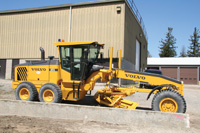 |
|
| This Volvo G976 grader was donated to Fleming College by VOLVO Construction Equipment.
|
|
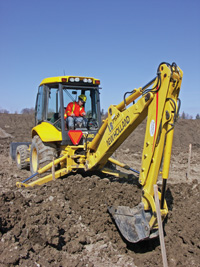 |
|
| Digging Deep: A student operator gets busy in a New Holland LB75B loader backhoe.
|
In addition to his work at the Fleming campus, Miller provides off campus training and certification at equipment owners’ sites. Common core training is mandatory for surface mining production employees in Ontario, with employees required to take a training module appropriate to their work areas as part of their individual common core training. A loader operator, for instance, is required to take three common core modules plus the loader operator module. Employers may also nominate a group of employees for equipment training and seek Miller’s assistance in the assessment and training process.
A number of industry related courses are offered by Fleming College under its Skilled Trades and Apprenticeships programs. The Resource Drilling and Blasting program is described as the only one of its kind in the world, again with a hands-on emphasis and 80 per cent of the program’s time allocated to practical learning sessions. In addition to utilizing Fleming’s facilities, students on this program also work in local quarries. The Blasting Techniques program is described as unique to Fleming College in Canada and prepares students for employment by quarrying, drilling and blasting, mining, and construction companies as well as the special effects industry. The College’s Electrical Power Generation program covers the installation, maintenance and testing of diesel, gasoline and natural gas electrical power generation units up to 10,000 kW.
The Canadian Association of Equipment Distributors (CAED), Ontario Chapter, sponsors the Centre for Heavy Equipment Technology at the Frost Campus in Lindsay with its member companies who sell, service and use heavy equipment.
Fleming College is located in Central Ontario and has campus locations in Peterborough, Lindsay, Cobourg and Haliburton. The college features more than 90 full-time programs in business, community development, environmental and natural resource sciences, fine arts, health and wellness, law and justice, and technology and skilled trades. Fleming College has 5,000 full-time and 10,000 part-time students, and more than 50,000 alumni. The College is named after Sir Sandford Fleming, (1827-1915), inventor of Standard Time and engineer in charge of construction and surveys for the Northern and Canadian Pacific railways.
| Fleming College program information Carmen T. Moore, Co-ordinator Heavy Equipment Programs, Sir Sandford Fleming College P.O. Box 8000 Lindsay ON K9V 5E6 Phone: 1-866-353-6464 or 705-324-9144 ext. 3212 Fax: 705-878-9333 carmmoor@flemingc.on.ca www.flemingc.on.ca |
Print this page